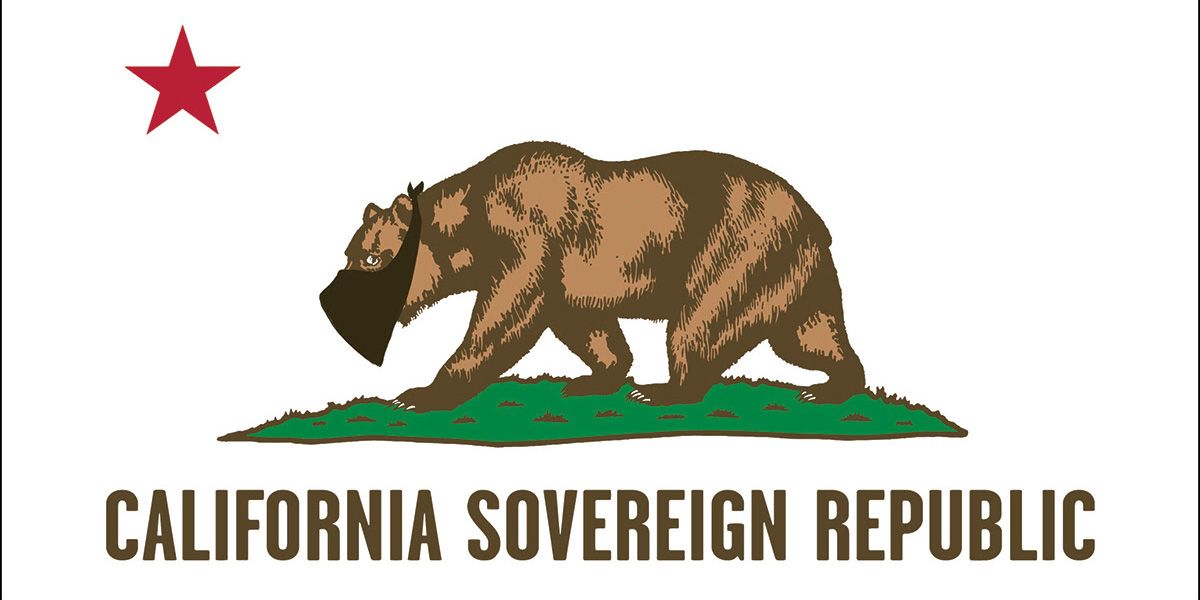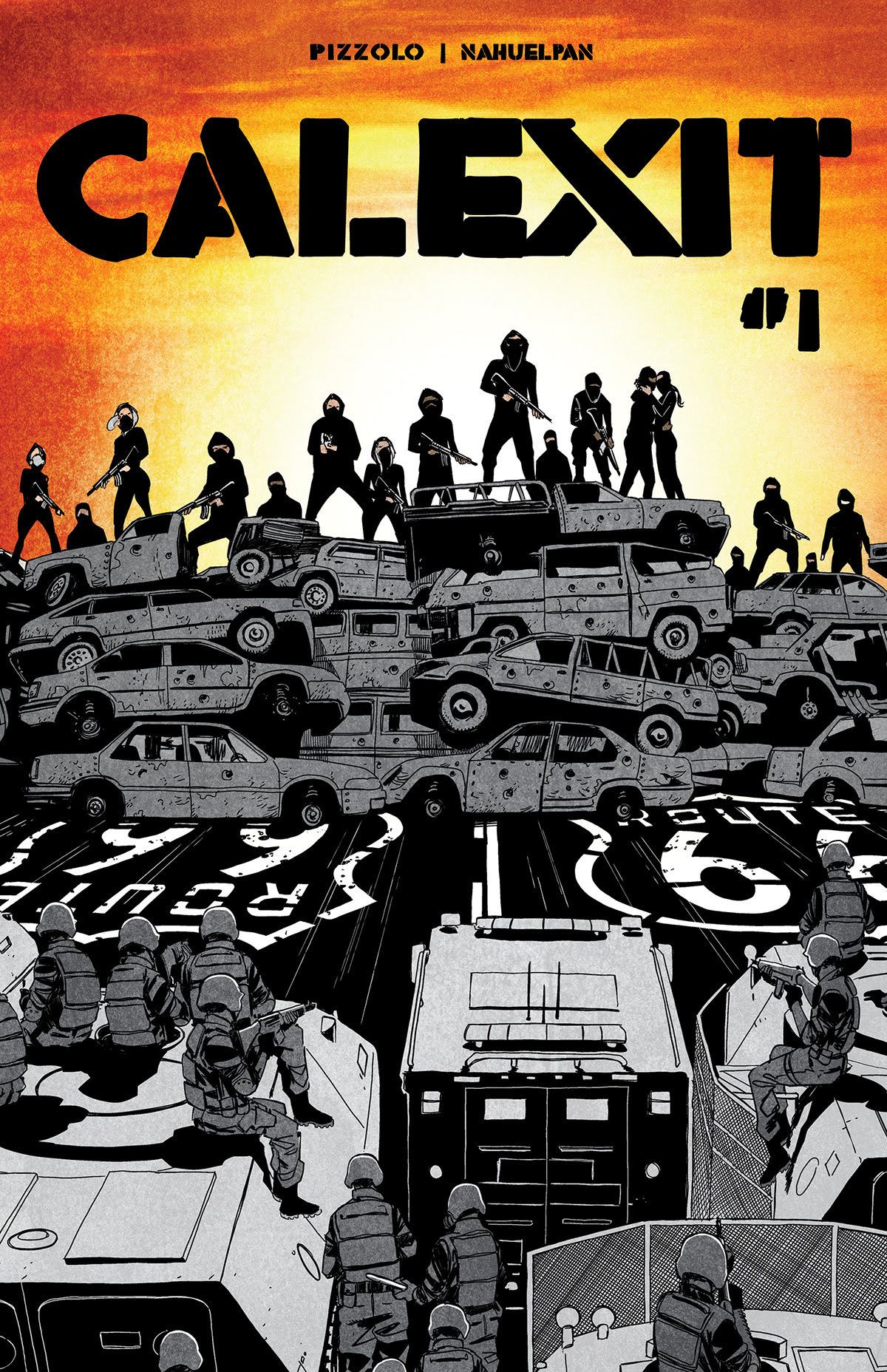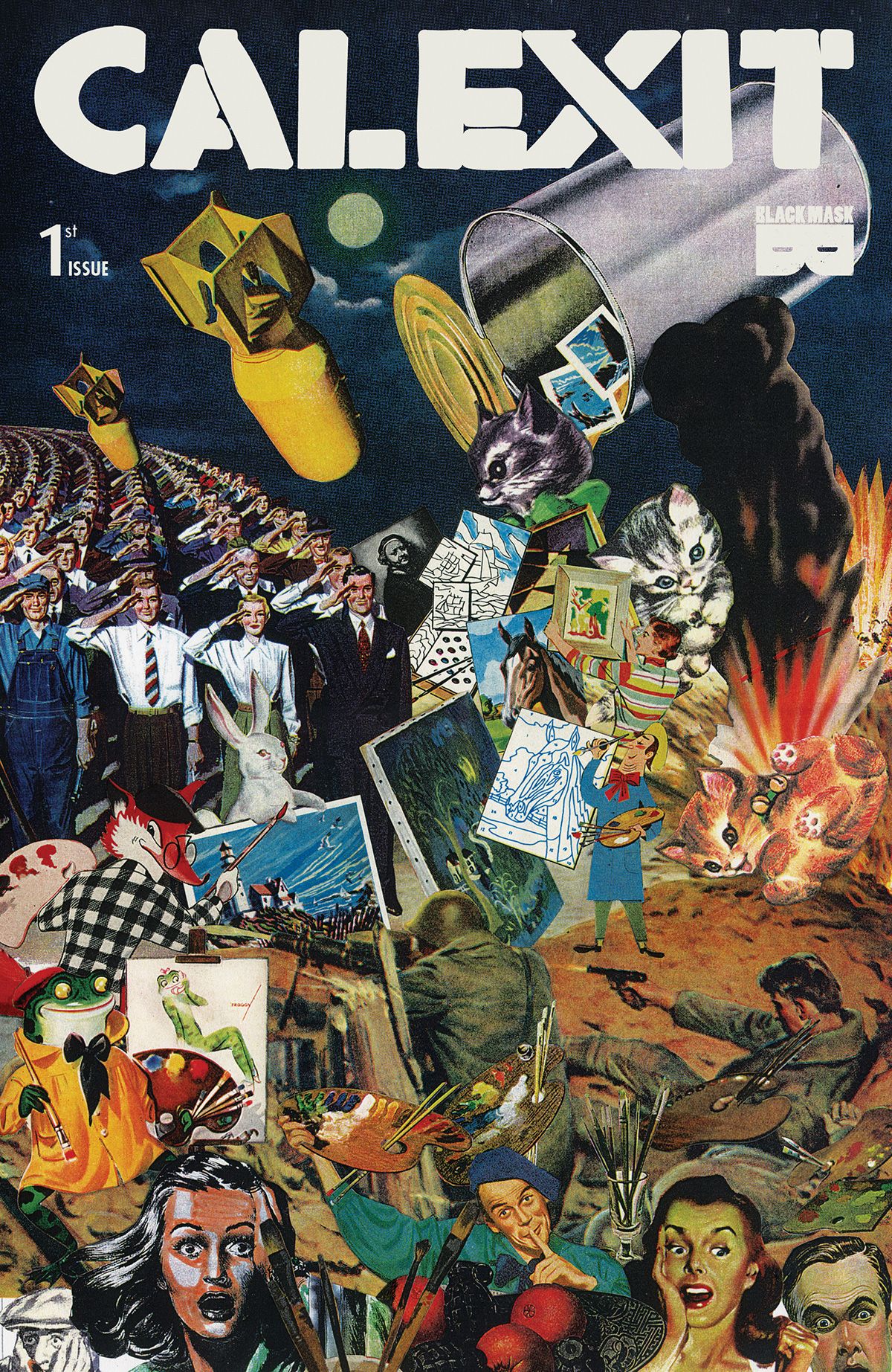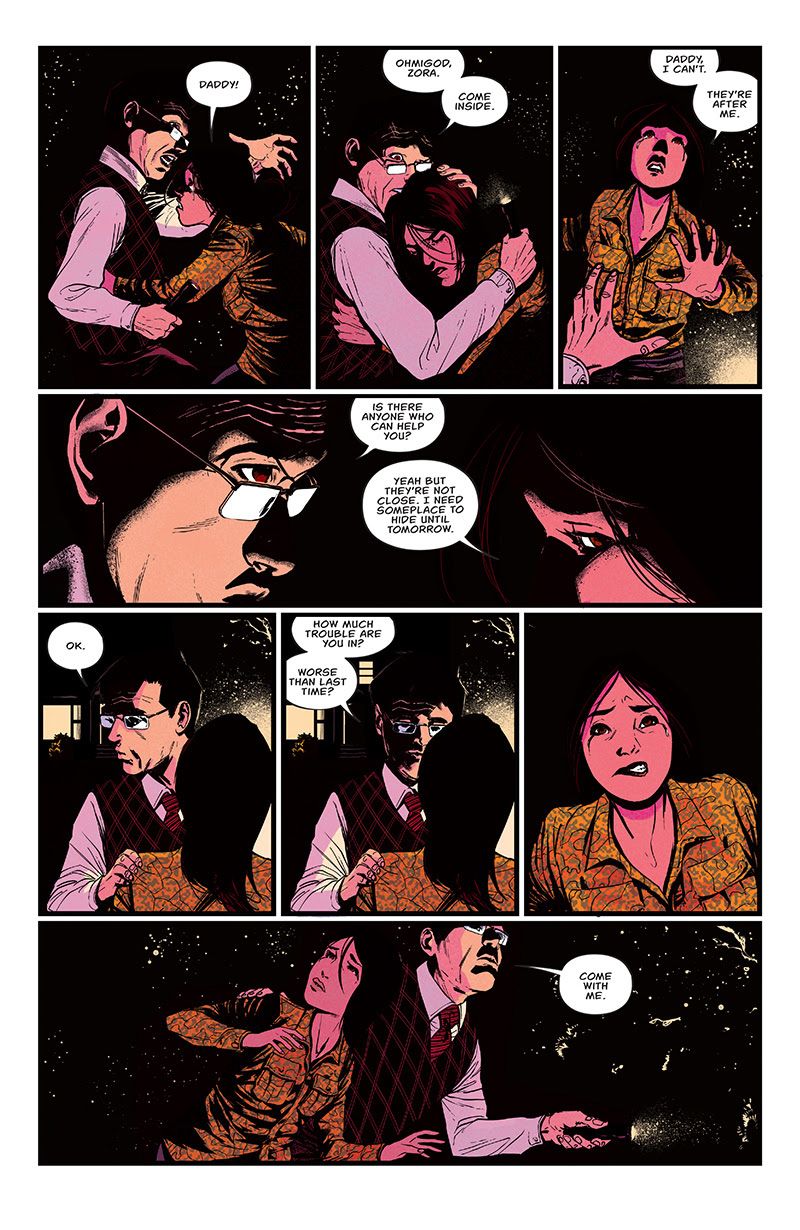If you've looked at the news in the past year and thought "truth is stranger than fiction," imagine how Matteo Pizzolo feels.
The writer and co-founder of comic book publisher Black Mask Studios conceived of Calexit during the 2016 presidential election cycle, which, if you've somehow forgotten, was an especially charged and unorthodox campaign season. The story imagines a California that's seceded from the United States due to oppressive immigration policy -- thus the title, a spin on "Brexit."
As Pizzolo explains in an essay in the back of Calexit #1, following the conception of the comic, an actual "Calexit" movement occurred, later dismissed as a Russian-led scam. After Donald Trump won the presidential election, protests erupted over immigration policy, with some of the largest demonstrations in California. California Gov. Jerry Brown signed a climate deal with China, following Trump's announcement the U.S. will depart from the Paris Climate Agreement.
Or as Pizzolo himself succinctly puts it: "shit’s been hurtling into the fan at an accelerated pace lately."
CBR spoke in-depth with Pizzolo, a Los Angeles resident, about the conspicuous timing of Calexit, which launches this week from Black Mask. Pizzolo also discussed the book's two main characters -- Zora, a heroic immigrant on the run, and Jamil, an apolitical smuggler -- the artwork of Amancay Nahuelpan and Tyler Boss and the book's nonfiction backmatter (which in the first issue includes interviews with political activst Amanda Weaver, director Lexi Alexander and author Bill Ayers), along with a bit of reflection on the first five years of Black Mask Studios.
CBR: Matteo, I think of all the striking parts of Calexit #1, the thing that shocked me the most was the revelation in the backwater that this idea actually predates the results of the 2016 presidential election, since it reads like a direct response to that. What was the early development of this series like, and in what ways did the outcome of the election and our current political reality affect it?
Matteo Pizzolo: Whether or not Trump won, the 2016 election cycle looked pretty horrible from my vantage point, and so the book was very much conceived in that toxic political environment. The tale of a young immigrant woman on the run from a militarized police force would, sadly, be timely and crucial under most administrations. But, besides that being the cauldron in which the story was conceived, the scripting and illustration was done post-election, and so the election affected us in a bunch of ways. One way it affected us is that we have to be pretty fast and nimble to stay in the realm of dystopia fiction and not have the real world catch up and lap us.
The setup of the story is that California is forced to secede after taking a principled stance against an oppressive US immigration policy, causing California to be occupied by a militarized National Guard while an alliance of international sister cities forms to support California. Now, before issue #1 even hits stores, the Supreme Court has partially lifted state-led injunctions on Trump's travel ban, California formed an alliance with other states to take a principled stance against US policy, California made a deal directly with China in direct defiance of US policy, the President threatened to deputize the National Guard, there was an actual Calexit ballot initiative that was later exposed as a Russian scam… it’s actually really hard to keep the story world grounded while also making it feel a bit futuristic/dystopian. Real life isn’t feeling very grounded these days.
At the same time, we don’t want this book to read as a cartoonish satire mocking the Trump administration. After all, baiting mockery is this administration’s most effective form of political jiu-jitsu, and again the book’s story purpose predates this administration. So we had to be pretty delicate in engaging with many of the horrible things that are happening right now while also keeping enough distance to make sure the book faces down universal truths about who we are as a nation.
Black Mask as a publisher has its very foundations in political material, and this is certainly reflective of that mindset. Even though this is a speculative, dystopian story (for now), it's rooted in real life. As a writer, how you approach the balance between making something resonant as a political work, while also telling a serialized comic book story?
As a writer my job is to serve the story and characters. If this becomes a bunch of caricatures spouting off my political opinions as dialogue, then I’ve completely failed. The book certainly has a point of view and a story purpose that I believe in, but Zora and Jamil are characters I love -- they’re flawed and conflicted and as fearful as they are brave, and they’re in a horrible situation that gives me great sympathy for them… and, frighteningly, our current real world gives me maybe more empathy for them than I would like.
The story opens with a father trying to protect his daughter from The State. I was writing it shortly after my baby daughter was born, and it was real challenging to write that. Because, of course, the father can’t protect his daughter. We’re giving our children this world that we’ve not been great stewards of and they will have to fight to make it better, and that’s a pretty awful inheritance. But the book isn’t proselytizing that, that’s simply the personal connection I make while writing what the characters are contending with. Comics are driven by characters and I have to always remind myself of that, especially when working on a book that has a political point of view -- the characters need to be deep and personal in order for the story to be worth reading.
On a similar note -- how do you see comics as the perfect medium to tell a story like this?
I love comics because they are collaborative while still being intensely personal. On Calexit and before that Young Terrorists, Amancay and I are collaborative and go back and forth, but we work separately on our intensive creative processes. And then Tyler Boss brings a new perspective with the colors and Jim Campbell brings another perspective with the letters. And it can stay that small, but it can also expand however we choose. We can invite people we respect from other media to add to the world: Rich Nisa designing the maps, Robert Anthony Jr designing the flags and emblems of the various political factions, Amanda Weaver and Bill Ayers and Lexi Alexander bringing their unique perspectives on the real-world side of these issues. So we can all be contributing on an intensely personal level, but we can widen the canvas to include as many collaborators as makes sense.
And the interface with the reader is very personal as well. You don’t read comics in a huge theater with 500 other people or on a big screen TV across the room, you hold it in your hand. And there’s barely any barrier between the creators and the readers, especially at this level. We’re all right there across the table at cons and we love nothing more than dialoguing with readers about the stories. For Calexit we’re even touring to dozens of comic shops so we can engage directly with audiences, the fact that comics still have brick & mortar stores where we can participate in local communities doesn’t really exist anywhere else. It’s something all creators and readers should really value and appreciate.
Zora is a compelling figure from her first introduction. What can you say about the character, and the mission she's on in Calexit?
Zora is one of my favorite characters I’ve ever written, because she is extremely strong and also very vulnerable. She’s grappling with being on the run from Father Rossie, the fearsome immigrant-hunter, but on a lot of levels she doesn’t want to run from him, she wants to be hunting him down herself and getting revenge. So she has one mission that she’s on as a leader in the resistance movement, but she also has a personal mission driven by her sense of family and her personal dignity and fury. Those two missions conflict with one another. Chasing revenge would put her resistance fighters in jeopardy, it could put the entire resistance in jeopardy… she recognizes that logically, but in the fog of war when she’s making crucial decisions under duress, what will she do?
Jamil is the other main character we meet in #1, and is certainly starting out with very different goals than Zora. What's driving him in this story?
Jamil, who calls himself a "friendly neighborhood courier" even though he’s actually a smuggler, is a survivor, his entire career and reputation is based on being apolitical, having no enemies, and serving as a friend to all sides. As the story progresses, we’ll learn he has a few secrets of his own that make him want to cling to his neutral stance even when things have gotten so bad that any rational person would feel compelled to take a side. By the end of his journey he’ll be forced to choose, and even he won’t know which direction he’ll go until the choice is ultimately made.
The art team of Amancay Nahuelpan and Tyler Boss have an interesting task in this series -- dealing with familiar, real-life locations that obviously are familiar, but in a world that's put them into a different context. For you, what made them right for this series?
I trust Amancay and Tyler implicitly and I know they're both extremely thoughtful in their creative choices. Beyond the fact that they're both immensely talented, I know that when they’re in their studios doing the work they are challenging my script at every step and always adding value. Calexit needs to feel like you’re authentically in the real world, it needs to be steeped in what makes California unique while at the same time feeling completely universal. That’s not something you can phone in, it forces each panel to be rendered with a lot of intent and thought.
They're also some of the hardest working artists I’ve had the privilege of working with. I’ve worked with both Amancay and Tyler on previous projects that had us pulling grueling hours all through the night -- well past dawn here in LA and their timezones are hours ahead of mine! Being artistically brilliant isn’t enough, an effective comics team also has to be insanely committed to doing the work, and both Amancay and Tyler have demonstrated again and again that they are not just brilliant but also fiercely committed. And seriously, Clandestino and 4 Kids Walk Into A Bank are two of my favorite books right now.
The interviews in the back of the issue are a great addition, and you've talked with some major names. How important was it for you to make this a part of the series, and will they continue in future issues?
The nonfiction backmatter will definitely continue through all the issues. It's crucially important to me because in the front of the book my job is to serve the story and if things needs to get dark and depressing then I have to pursue that, but I also can’t ignore the historical place and time this book exists in and I do not want readers to put the book down more depressed than they picked it up. Calexit doesn't wallow in dystopia, but this is serialized storytelling so some of the issues will end on really dark notes. The second half of the book enables me to expand the canvas of the project to include real-world, constructive, optimistic perspectives. No one has to read the backmatter, if a reader just wants to enjoy the story then it can be totally ignored -- after all, it’s not even supplemental story material, right now it’s just interviews with people I personally find fascinating. I don’t know how it will evolve over the life of the series, but it’s a space I’m really excited to explore.
Black Mask is now more than five years into its existence, and has produced a variety of successful and thought-provoking series. As a co-founder, what are your thoughts on how the company has developed over the past half-decade?
Yikes, you’re making me feel old haha. I’ve heard a few people say 2017 is our 5th year anniversary, but to my mind our 5th anniversary isn’t until May 2018 because our first book was released on May 8, 2013. But for sure we’ve been working on the company for five years now, and I must say the experience has really obliterated any expectations I had. I knew there were incredibly bold and visionary creators that I would want to support, but I could not possibly imagine that the market would be so supportive of our efforts.
I used to work at St. Mark’s Comics, which specializes in a particularly deep selection of underground and alternative comics. Many of those outsider-type comics are some of my all-time favorite books, and they have rabid readerships and passionate supporters, but generally that all takes place in a very specific sector of the market. When we conceived the company, I fully expected Black Mask to operate in that sector and generally be overlooked by the broader market. So the fact that our books and the creators we’ve devoted ourselves to are being supported so broadly by the comics press and the retailers and readers is shocking to me in the best possible way. The creators we publish are my favorite creators in comics and I think they’re all insanely talented, but I never expected the Big 2 to be recruiting directly from these books, so that’s been really incredible to see. The whole market is just constantly evolving and changing, and it’s an exciting time to be part of it all. I feel really blessed to be part of comics at a time when the market is as robust and provocative and chaotic and contentious and joyous and wild and lawless and supportive as it is right now. And to be able to do an incendiary book like Calexit where we take all the risks we want to and never have to self-censor anything, and then to have it covered on an industry-leading site like CBR alongside coverage of all the greatest and most popular comic books on shelves, that is just absolutely baffling and wonderful.
Calexit #1 is on sale this Wednesday, July 12 from Black Mask Studios.





